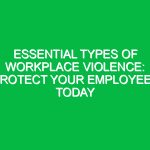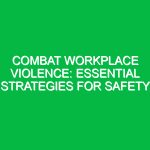Welcome to Today’s Toolbox Talk
Good morning, everyone! Thank you all for joining today’s Toolbox Talk. Our focus today is on a topic that might seem simple at first glance but is incredibly vital for our health, safety, and overall work performance—Eating Habits. Understanding and adopting essential eating habits can make a significant difference in how we feel, perform, and stay safe on the job. Let’s dive in!
The Importance of Eating Habits in the Workplace
Eating habits refer to the regular choices we make about what we consume. These choices can directly influence our physical health, mental well-being, and Safety performance at work. Poor eating habits can lead to fatigue, decreased concentration, and even accidents, while healthy eating habits can enhance our energy levels and ability to focus. In the Health, Safety, and Environment (HSE) context, the foods we choose can impact not only our individual health but also the overall Safety culture in our workplace.
How Eating Habits Affect Our Work Performance
Consider this scenario: You’re on a construction site, working hard under the sun. You skipped breakfast and opted for a sugary snack mid-morning. By noon, you’re feeling sluggish and unfocused. This is a classic example of how poor eating habits can lead to decreased productivity and even increase the likelihood of accidents. In contrast, imagine starting your day with a balanced meal—whole grains, protein, and fruits. You’d likely feel more energized and alert, ready to tackle the challenges ahead.
Key Eating Habits for a Safer and Healthier Workplace
1. Prioritize Balanced Meals
Balanced meals consist of appropriate portions of carbohydrates, proteins, fats, vitamins, and minerals. A good rule of thumb is to fill half your plate with fruits and vegetables, a quarter with lean protein, and a quarter with whole grains. This balance provides the essential nutrients your body needs to function optimally.
2. Stay Hydrated
Water is crucial for maintaining energy levels and cognitive function. Dehydration can lead to fatigue, impaired focus, and even heat-related illnesses, especially in physically demanding jobs. Aim to drink at least eight 8-ounce glasses of water a day, or more if your work involves physical exertion.
3. Snack Wisely
Healthy snacks can keep your energy levels stable throughout the day. Instead of reaching for chips or candy, consider options like nuts, yogurt, or fruit. These snacks provide sustained energy without the crash that comes from sugary snacks. For instance, a handful of almonds can keep you feeling full and focused without the sugar spike.
4. Avoid Skipping Meals
Skipping meals can lead to overeating later in the day and can significantly impact your mood and energy levels. Make it a point to have regular meals and snacks to help maintain stable blood sugar levels. If you’re on the job and don’t have time for a full meal, bring along healthy snacks to keep your energy up.
5. Plan Ahead
Planning your meals can help you make healthier choices and avoid the temptation of fast food or unhealthy snacks. Spend some time each week preparing meals and snacks that you can easily grab on the go. This could be as simple as packing a lunch the night before or preparing larger portions that can be reheated for quick meals.
Real-life Examples of Healthy Eating Habits
Let’s take a moment to consider two employees—John and Sarah. John frequently skips breakfast and relies on coffee and donuts to get through the morning. He often finds himself feeling tired and unmotivated by midday. On the other hand, Sarah makes it a point to eat a hearty breakfast, including oatmeal and fruit. She feels energized and focused throughout the day, able to tackle her tasks with enthusiasm. This difference in their eating habits greatly impacts their work performance and overall well-being.
Potential Hazards Related to Poor Eating Habits
Understanding the risks associated with poor eating habits is crucial. Some potential Hazards include:
- Fatigue: Poor nutrition can lead to fatigue, increasing the risk of accidents and injuries.
- Decreased Concentration: A lack of essential nutrients can impair cognitive function, making it harder to focus and stay alert.
- Increased Stress: Unhealthy eating can contribute to stress levels, which may lead to distractions and a negative work environment.
- Long-term Health Risks: Consistently poor eating habits can lead to chronic health issues such as obesity, diabetes, and heart disease.
Best Practices for Healthy Eating in the Workplace
1. Create a Supportive Environment
Encourage a culture of health and wellness at work. This can include providing healthy food options in vending machines, hosting nutrition workshops, or creating a designated area for employees to eat their meals.
2. Lead by Example
As leaders and team members, we should model healthy eating habits. When others see colleagues making nutritious choices, they may feel inspired to do the same. Share your meal prep tips or healthy recipes during breaks to promote a culture of healthy eating.
3. Educate and Engage
Regularly hold Toolbox Talks focused on nutrition and healthy eating. Use these sessions to share information, discuss challenges, and brainstorm solutions. Engaging employees in discussions about their eating habits can foster a sense of community and accountability.
Regulations and Standards Related to Eating Habits
While there may not be specific Regulations governing eating habits, many Workplace Health and safety standards emphasize the importance of maintaining employee health to prevent accidents and injuries. For example, OSHA (Occupational Safety and Health Administration) provides guidelines to create a safe and healthy work environment, which includes considerations for nutrition and health. By promoting healthy eating habits, we can help ensure compliance with these guidelines and foster a safer workplace.
Conclusion: Your Role in Promoting Healthy Eating Habits
In conclusion, adopting essential eating habits is crucial for maintaining our health, enhancing our safety, and improving our overall performance at work. By prioritizing balanced meals, staying hydrated, and planning our food choices, we can significantly impact our work environment. Remember, it’s not just about individual health; it’s about creating a culture of safety and well-being for everyone.
Thank you for your attention today. I encourage you to reflect on your eating habits and consider how you can make positive changes. Let’s all commit to adopting healthier eating practices for our own benefit and the safety of our colleagues. Does anyone have any questions or experiences they’d like to share about how eating habits have affected their work performance?


